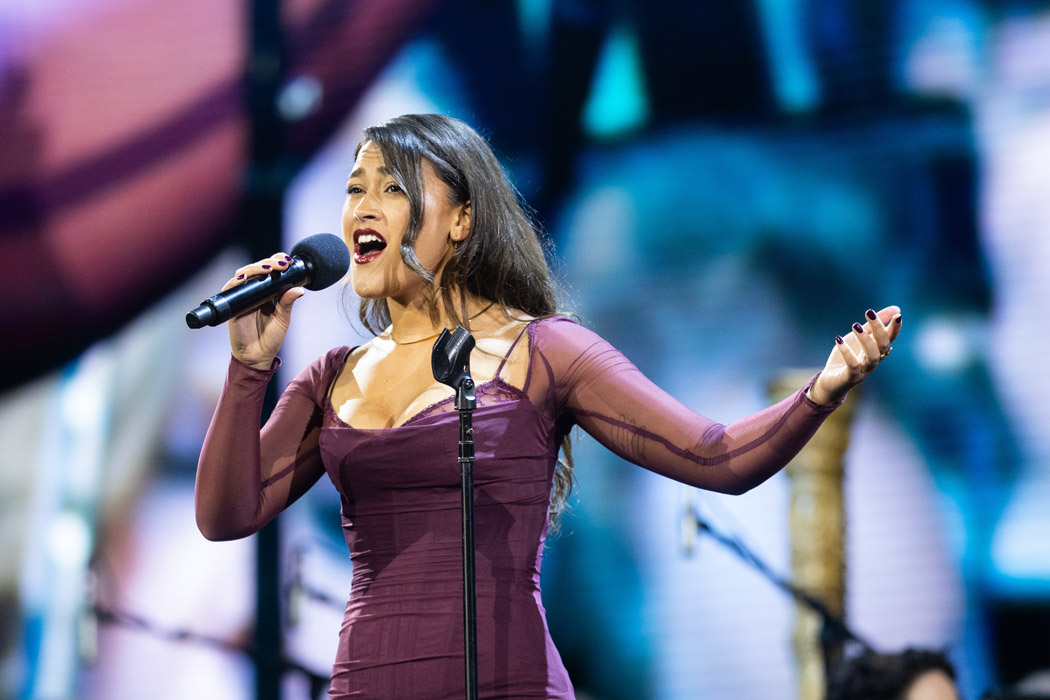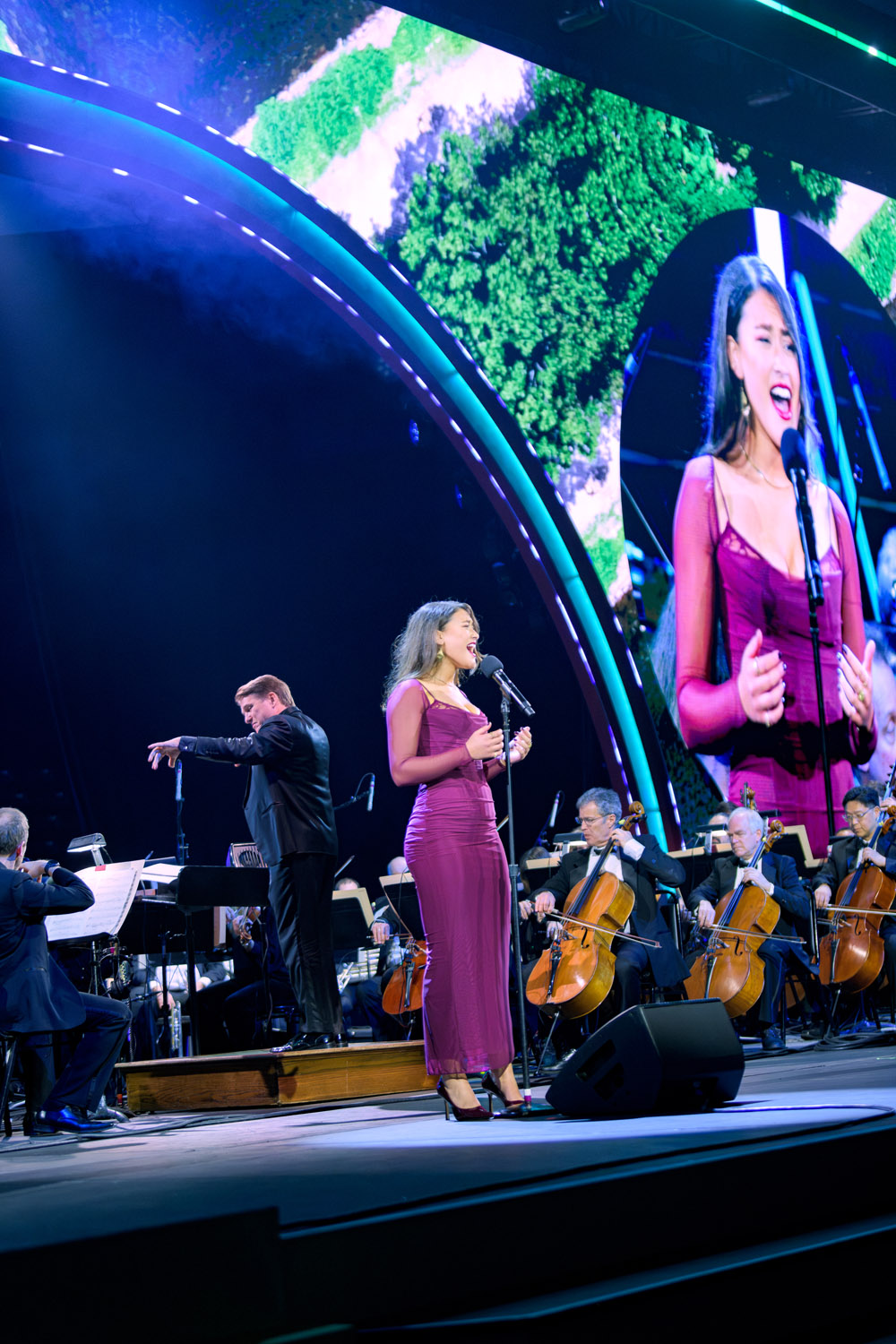Meet Sofia Burke '25
Before Sofia Burke ’25 took the stage at this year’s Pops on the Heights: The Barbara and Jim Cleary Scholarship Gala—a celebrated BC tradition that was the biggest solo performance of her life—she sat quietly in the wings.
That September night, she waited, taking deep breaths. When it was time to go on stage—as part of a Pops lineup in a sold-out Conte Forum that would include a performance by the Grammy-winning rock band the Goo Goo Dolls—she felt an intense rush of nerves. But as she reached the stage, Burke knew she was ready.
After all, she has been singing her whole life. Years before she earned a solo spot for Pops on the Heights, before that gala night when thousands of people took their seats in Conte Forum, and before that moment when conductor Keith Lockhart and the Boston Pops were poised to begin accompanying her singing of Simon and Garfunkel’s “Bridge Over Troubled Water,” Burke was already making music.
“I don’t know if it’s true, but my mom likes to say I could sing before I could talk. She says she was working one day and heard the melody of ‘Twinkle Twinkle Little Star’ floating over, and that I was humming it,” said Burke.
A life of music followed from that first melodious moment: piano and flute classes, singing and competing in school choirs, and formal lessons. When Burke first started looking into colleges, she seriously considered music conservatories but ultimately decided she’d prefer to keep music as a hobby. Her sister had gone to a Jesuit university too and told Burke about the importance of service in a Jesuit education. That resonated deeply; their father had worked with Cesar Chavez in the Farm Workers Union to advocate for farm workers’ rights.
BC was the only school Burke toured in person because of COVID. “I loved it when I first saw it.”

Sofia Burke on stage at Pops on the Heights (Scott Eisen)
Although she didn’t choose BC for its music scene, Burke has balanced her musical talent with her drive for justice. A sociology major on the pre-law track with minors in Managing for Social Impact and the Public Good and philosophy and theology, Burke followed her interests through service experiences like Appalachia Volunteers and the PULSE Program, an internship with the Center for Human Rights and International Justice, and the BC bOp! jazz ensemble.
“There were a lot of hard days at the beginning of college,” said Burke. “bOp! was the only musical group I had time for. I’m so happy I stayed with it because the community is great and it’s the perfect combination of instruments and vocals for me.”
Within the classroom, she’s found philosophy and theology classes to be among the most meaningful because they’ve helped her see an intersection between music and human rights.
“We talk about entering into communion with people, about humanizing the other, and about seeing human dignity in any scenario. Because American music is so connected to issues of race and class, it’s really what I’m studying all the time as a sociology major. And when I’m performing, music is how I experience human dignity most strongly.”

In class, "we talk about entering into communion with people, about humanizing the other, and about seeing human dignity in any scenario...And when I’m performing, music is how I experience human dignity most strongly.” (Scott Eisen)
That passion for the human experience was given life through Burke’s soulful rendition of “Bridge Over Troubled Water” in her Pops on the Heights performance. She had known she would audition for the coveted solo since her sophomore year when she first attended the event, and finally, last spring after the two-part audition process, Burke landed the role. After working with a vocal coach, Burke settled on “Bridge Over Troubled Water” because of its grandiosity.
“The rendition we did hadn’t really been done before,” Burke explained. “It was with a full orchestra and influenced by soul, a genre of music that has a lot to do with United States history.”
By the time Burke completed her Pops on the Heights performance, letting the song build before finishing it softly and displaying her incredible range, the audience was already applauding. Amid the glow, Burke recalls racing backstage to her friend for a hug.
“It was a really sweet moment. From there I found my family, and it was a really fun night,” said Burke.
As she draws closer to her graduation in May, Burke is figuring out her next act.
“I just finished applying for a Fulbright grant. It’s so competitive, but we’ll see,” said Burke, who is particularly interested in Ghana because of the West African region’s rich history of musical traditions. “I applied to Ghana because it’s an Anglophone country. With English as the first or second language for many, the focus will be building solidarity with students. What better way to do that than through the exchange of music?”
And if the Fulbright doesn’t happen?
“I have a million backup plans,” said Burke with a smile. “That’s life, and I’ll figure it out.”
